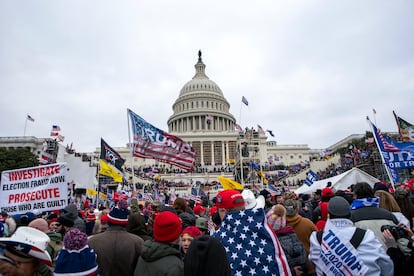Supreme Court limits charges against Jan. 6 rioters in ruling that could benefit Trump
The justices have ruled that the crime of obstruction of an official procedure is not applicable in the assault on the Capitol, despite the hundreds of convictions that have been handed down

Hundreds of people who participated in the assault on the U.S. Capitol have been charged with obstruction of an official proceeding. The official proceeding was the certification of Joe Biden’s victory in the 2020 presidential election. Former U.S. president Donald Trump is charged with that same offense in the Washington criminal case over his efforts to reverse the election result.
However, the U.S. Supreme Court’s ruling on Friday in the case Fischer v. United States has found that this charge cannot be applied to many of the rioters. After Thursday’s presidential debate in Atlanta, it is another triumph for Trump, who is still waiting for the Supreme Court to rule on whether his actions after the 2020 election are protected by presidential immunity — a ruling that is expected on Monday.
“To prove a violation of [the section in question] the Government must establish that the defendant impaired the availability or integrity for use in an official proceeding of records, documents, objects, or as we earlier explained, other things used in the proceeding, or attempted to do so,” states the Supreme Court ruling, which was approved by 6-3 vote which did not fall down ideological lines. Conservative Justice Amy Coney Barrett voted against it, while the liberal Justice Ketanji Brown Jackson voted in favor. In other words, the Supreme Court ruled that the storming of the Capitol cannot be considered the obstruction of an official proceeding, as it did not involve destroying evidence or anything similar.
The Supreme Court ruling is in response to an appeal made by Joseph Fischer, who was charged on several counts for his role in storming the Capitol, but it could affect the other rioters who took part in the January 6 assault and were convicted of obstruction of an official proceeding.
During the hearing, the conservative justices questioned whether an article that was drafted within a law intended to punish the destruction of evidence in financial crimes could be applied to what they called political “protests.” They argued that opening this door meant granting a free pass to the Prosecutor’s Office to prosecute protests as it saw fit. Some of the justices implied, moreover, that this rule had never meant to be applied in this context.
“The Government’s theory would also criminalize a broad swath of prosaic conduct, exposing activists and lobbyist to decades in prison,” the ruling states. “The Government’s interpretation would give prosecutors broad discretion to seek a 20-year maximum sentence for acts Congress saw fit to punish with far shorter sentences.”
Trump did not directly participate in the assault on the Capitol; his attempts to obstruct the official procedure to certify Biden’s victory in the elections were carried out through other means. However, the Supreme Court’s ruling could affect two of the four counts in the Washington case over his efforts to subvert the results of the 2020 elections.
In this case, Trump is charged with: conspiracy to defraud the U.S. government, conspiracy to obstruct an official proceeding, obstruction or attempted obstruction of an official proceeding and conspiracy to violate civil rights. The second and third counts concern the charge at the center of Friday’s ruling, and the Supreme Court’s decision will make it much more difficult for Trump to be found guilty of these counts.
Considered on its own, that description of obstruction of an official proceeding seems to clearly apply to the rioters who stormed the Capitol, as the liberal justices pointed out. But the fact that the article falls under rules aimed at preventing the destruction of evidence raised questions about the spirit in which it was intended. The Supreme Court considers that rules with vague wording must be applied restrictively.
The crime in question is regulated in the U.S. criminal code in 18 US Code section 1512, which states in (c)(2) that “whoever corruptly… obstructs, influences, or impedes any official proceeding, or attempts to do so, shall be fined under this title or imprisoned not more than 20 years, or both.” The title of that provision is “Tampering with a witness, victim, or an informant.” That section was passed as part of the Sarbanes-Oxley Act of 2002, intended for prosecuting white-collar crime. Moreover, there are several words that leave room for interpretation.
The Supreme Court’s ruling in the Fischer case will affect dozens of the rioters convicted of the assault on the Capitol. At least 353 defendants were charged with corruptly obstructing, influencing, or impeding an official proceeding, or attempting to do so, according to a recent count from the Justice Department. It is one of the most-used charges to persecute the rioters who stormed the Capitol.
Sign up for our weekly newsletter to get more English-language news coverage from EL PAÍS USA Edition
Tu suscripción se está usando en otro dispositivo
¿Quieres añadir otro usuario a tu suscripción?
Si continúas leyendo en este dispositivo, no se podrá leer en el otro.
FlechaTu suscripción se está usando en otro dispositivo y solo puedes acceder a EL PAÍS desde un dispositivo a la vez.
Si quieres compartir tu cuenta, cambia tu suscripción a la modalidad Premium, así podrás añadir otro usuario. Cada uno accederá con su propia cuenta de email, lo que os permitirá personalizar vuestra experiencia en EL PAÍS.
¿Tienes una suscripción de empresa? Accede aquí para contratar más cuentas.
En el caso de no saber quién está usando tu cuenta, te recomendamos cambiar tu contraseña aquí.
Si decides continuar compartiendo tu cuenta, este mensaje se mostrará en tu dispositivo y en el de la otra persona que está usando tu cuenta de forma indefinida, afectando a tu experiencia de lectura. Puedes consultar aquí los términos y condiciones de la suscripción digital.









































